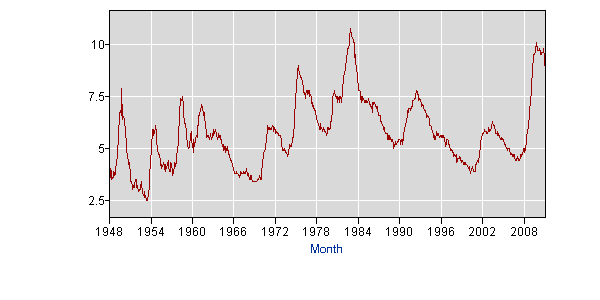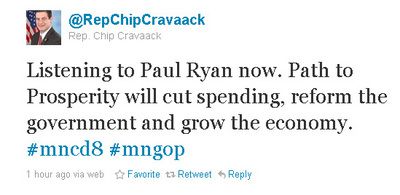Eighth District Congressman Chip Cravaack has apparently signed on to Wisconsin Rep. Paul Ryan’s budget-cutting plan that constitutes the line in the sand some Republicans are drawing in Washington.
Ryan unveiled his proposal in a Wall Street Journal column this morning (and a very spiffy Web site here), calling for cuts in domestic spending, Social Security (it’s called reform, however), welfare, Medicare, the health care law, alternative energy programs etc.
Says Ryan:
A study just released by the Heritage Center for Data Analysis projects that The Path to Prosperity will help create nearly one million new private-sector jobs next year, bring the unemployment rate down to 4% by 2015, and result in 2.5 million additional private-sector jobs in the last year of the decade. It spurs economic growth, with $1.5 trillion in additional real GDP over the decade. According to Heritage’s analysis, it would result in $1.1 trillion in higher wages and an average of $1,000 in additional family income each year.
It also says the unemployment rate will be 2.8% by the next decade. “It’s an assumption, in other words, that’s unrealistic enough to be considered somewhat bizarre,” The Economist says. “Everyone puts a positive spin on their policy proposals. But fundamentally worthy policies shouldn’t need to promise laughably overoptimistic outcomes to win support.”
For the record, the unemployment rate has only been that low once — 1953.

The study is not from a non-partial source. It’s from the Heritage Foundation, “whose mission is to formulate and promote conservative public policies based on the principles of free enterprise, limited government, individual freedom, traditional American values, and a strong national defense.”
The Economic Policy Institute leans in the other direction and — funny — has a different view:
“This budget is impressive in its ability to not only inflict maximum harm on the economy, but to concentrate that harm on those most in need,” its director, John Irons, said today. “This will not only cost the economy hundreds of thousands (and perhaps millions) of jobs over the next five years, it will also destroy the social safety net and undermine policies that support the middle class.”
It’s just the kind of debate that demands the curmudgeonly hand of CNBC’s Mark Haines

